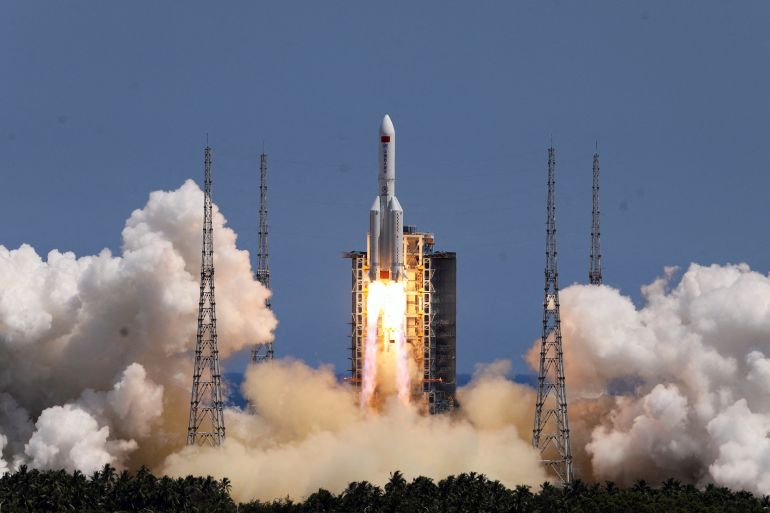Philippines on watch for rocket debris after Chinese space launch
China launched the Long March 7A rocket on Tuesday, prompting warnings by authorities in the Philippines of the potential dangers to ships and aircraft from falling debris.

The Philippines remains on alert for reports of fallen rocket debris following China’s launch of a powerful space rocket that authorities in Manila had warned could potentially endanger aircraft and ships.
China launched the Long March 7A rocket on Tuesday night from the Wenchang Space Launch Site on Hainan island, which carried a satellite into orbit, China’s state-run Global Times reported.
Keep reading
list of 4 itemsRevisiting space debris: The rubbish you didn’t see coming
Debris from China’s rocket booster falls to Earth
South Korea’s first Moon orbiter launched into space
Debris has not been sighted so far and there have been no reports of injuries or damage to date, Philippine Space Agency spokesperson Tricia Zafra said on Thursday.
“So far, no sighting. We continue to seek out reports,” Zafra said. “Hopefully, no injuries or damages related to it.”
Rocket parts that detach before entering space should, by their design, fall offshore less than an hour after launch, Zafra said.
In July, debris from a rocket that was launched in China landed in Philippine waters in an uncontrolled re-entry, the agency said. There were no reports of damage or injuries.
The space agency warned that rocket debris from the latest launch could crash down in two possible off-shore locations, based on a notice to pilots from China’s civil aviation administration.
The agency identified the possible “drop zones” at 71 kilometres (44 miles) off Burgos town in the Philippines’ Ilocos Norte province, and 52 kilometres (32 miles) from Santa Ana town in Cagayan province.
“While debris from CZ-7A is unlikely to fall on land features or inhabited areas in the Philippine territory, falling debris still poses a considerable threat to ships, aircraft, fishing boats and other vessels that will pass through the drop zones,” the agency had said.
The agency called on the public to immediately inform local authorities if suspected debris was sighted at sea and warned people against retrieving or coming in close contact with space rocket materials.
The Civil Aviation Authority of the Philippines also warned pilots on Wednesday about the possible danger posed by the debris in the two northern Philippine offshore areas.
In July, fishermen in the West Philippine Sea about 160 kilometres (100 miles) off Mamburao town in Occidental Mindoro province found a torn metal sheet showing part of the Chinese flag and markings of the Long March 5B rocket, the space agency said.
China has faced criticism for allowing debris from its space rockets to fall to Earth uncontrolled on at least two previous occasions.
The United States space agency NASA accused Beijing last year of “failing to meet responsible standards regarding their space debris” after parts of a Chinese rocket landed in the Indian Ocean.
China’s first space station, Tiangong-1, crashed into the Pacific Ocean in 2016 after Beijing confirmed it had lost control of the facility. An 18-tonne rocket also fell to Earth uncontrolled in May 2020.
In 2007, China fired a missile to destroy one of its defunct weather satellites, creating a field of debris and a storm of criticism from other governments who said such action could jeopardise other satellites.